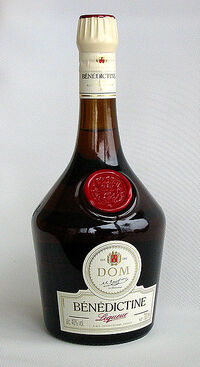Bénédictine is a French herbal liqueur beverage. Its recipe contains 27 plants and spices.
From Wikipedia[]
Bénédictine is an herbal liqueur beverage developed by Alexandre Le Grand in the 19th century and produced in France.
It is claimed that at the Benedictine Abbey of Fécamp in Normandy, monks had developed a medicinal aromatic herbal beverage which was produced until the abbey's devastation during the French Revolution, but in fact Alexandre Le Grand invented the recipe himself, helped by a local chemist, and he told this story to connect the liqueur with the city history to increase sales.
He began production under the trade name "Bénédictine", using a bottle with an easily recognizable shape and label. The family eventually sold the company to Martini and Rossi, which was in turn bought by Bacardi.
The recipe is a closely guarded trade secret, ostensibly known to only three people at any given time. So many people have tried to reproduce it that the company maintains on its grounds in Fécamp a "Hall of Counterfeits" (Salle des Contrefaçons). The bottle and label have been imitated, as has the name Bénédictine. The company prosecuted those it felt to be infringing on its intellectual property.
The manufacturing process involves several distillations which are then blended.
The same company also produces "B & B" (or Bénédictine and Brandy), which is Bénédictine diluted with brandy, making it less sweet than Bénédictine. B & B was developed in the 1930s when consumers began a trend of mixing Bénédictine with brandy to produce a drier taste. Both Bénédictine and B&B are 40% alcohol (80 proof) by volume. Until recently, both Bénédictine and B & B were 43% alcohol (86 proof). In 1977, the company introduced a 60 proof (30% alcohol) coffee liqueur, Café Bénédictine, a blend of Bénédictine and a coffee-flavoured liqueur, however, Café Bénédictine is no longer produced or available. Additionally, the company produces a Bénédictine Single Cask. Bénédictine Single Cask comes in a unique black bottle and is only available at the Palais de la Bénédictine's store in Fécamp, Normandy, France. Every bottle of Bénédictine has the initials D.O.M. on the label, which stands for "Deo Optimo Maximo" ("To God, most good, most great"). This abbreviation is commonly used at the beginning of documents of the Benedictine Order as a short dedication of the work.
Burnley Miners' Club in Lancashire, United Kingdom is the world's biggest single consumer of Benedictine liqueur, after Lancashire regiments acquired a taste for it during the First World War. Burnley Football Club also sell Benedictine on match days, making them the only English club to do this. Besides the B & B, cocktails using Bénédictine include the Frisco, Derby, Singapore Sling, Vieux Carré, Cornell Special, and Monte Carlo.
Recipes[]
| This page uses Creative Commons Licensed content from Wikipedia (view authors). | 
|

